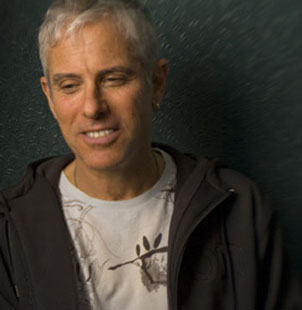 Jai Uttal’s eclectic East meets West sound has put his music at the forefront of the world fusion movement. Jai’s musical roots embrace a rich variety of cultures and traditions that span the globe and the centuries. From the hillbilly music of the Appalachian Mountains to the passionate strains of Bengali street singers, from the haunting rhythms and melodies of ancient India to contemporary electric rock sounds, Jai’s music distills the essence of diverse musical forms.
Jai Uttal’s eclectic East meets West sound has put his music at the forefront of the world fusion movement. Jai’s musical roots embrace a rich variety of cultures and traditions that span the globe and the centuries. From the hillbilly music of the Appalachian Mountains to the passionate strains of Bengali street singers, from the haunting rhythms and melodies of ancient India to contemporary electric rock sounds, Jai’s music distills the essence of diverse musical forms.
Integral Yoga Magazine (IYM): Is chanting healing?
Jai Uttal (JU): Yoga practices, meditation practices and devotional practices are all healing modalities. Most of us live a life in which we are locked down inside, very tightened up inside and very afraid. Spiritual practices untie that knot and melt the walls down. We are held by the great Mother and she sees our fear and she caresses us and says, “There there, it’s okay, I’m taking care of you,” and to me the surrendering into that trust is so much what the spiritual life is about. When I think of the great Mother, I think of my guru and his protective energy.
IYM: Did Ram Das introduce you to your guru, Maharaj-ji?
JU: When I was 19, my whole agenda got shattered immediately after I went to India and found out that the guru I had come to see was in prison. A lot of my beliefs, a lot of the illusions I had put on myself got shattered. I went to a bookstore and the bookseller said that Ram Das was in town giving classes in a hotel. In America, I had been friendly with Ram Das so I went to the hotel and they said he was visiting his guru in Vrindavan. I went to Vrindavan to see Ram Das and that is how I wound up meeting Maharaj-ji.
IYM: Did you immediately feel a connection?
JU: I had been with a guru who had turned out to be a murderer, so I was pretty jaded. My mind wasn’t ready for another guru, but my spirit was. Otherwise, I don’t think Maharaj-ji would have brought me to him. I wasn’t interested in a guru-disciple relationship, but what happened was that gradually Maharaj-ji started to reveal to me the eternity of our connection. It was like the veils that stopped me from being aware of this ancient connection gradually lifted and even to this day they are still lifting. Every time I have a sense of what the guru-disciple relationship is, I get blown away because it is not something that can be understood by the mind, but only by the heart.
Maharaj-ji came to me very strongly in dreams while I was there with him in India in the 1970s. Maybe he was able to penetrate my conscious mind better in sleep. In some dreams, he held me and there would be weeping, both from me and from him, with the sense that finally I’d come back to him. Over the many years, the practice of kirtan and the practice of mantra has always helped me to hold on to at least a thread of the connection. It was never broken.
IYM: What instructions did Maharaj-ji give regarding kirtan?
JU: There’s Ram Das’ famous quote when he asked Maharaj-ji how he could raise his kundalini and Maharaj-ji said: “Love people and feed them.” It’s not about how strong your Yoga practice is or how concentrated your meditation is, it’s really just about how open your heart is and how compassionate and giving you are. Once Maharaj-ji was asked, “What is the best form to worship God?” Maharaj-ji said, “Every form. The only thing that’s important is how much you love God.” He wasn’t saying that the only thing that is kind of important is how much you love God. He said that’s all that is important—that we see God in every form.
IYM: What is it about kirtan that seems to move us so deeply?
JU: One of the great things I love about kirtan is that we are singing all together but each has their own inner experience and prayer that is very unique. For me, there are things happening on some different levels. On one level, as I begin chanting, I imagine the deities and their energies. But very soon, I am not thinking about those forms but it becomes more of a combination of singing to my guru and singing to the inner vastness in my own heart—which ultimately does not seem to be different than my guru. When I sing—and it’s hard to define because it’s such a subtle process—it’s really an offering, a surrendering, of my limited self, my ego self, my agenda, my control, my personality and the whole package of Jai. It’s like each time I say the mantra or the melody, I’m offering all of this into the great ocean of God’s will, of God’s consciousness.
That’s not to say that a thousand times during the kirtan, I’m not daydreaming or wandering, but that inner attention is always a repeated offering, a repeated surrender. That’s the great thing about call and response: each repetition of the mantra is the surrender of my will, the light of me, the dark of me, every aspect of me, offering up to my guru, to the ocean of consciousness—whether it’s a simple melody or an elaborate melody, it’s all the same. An interesting thing about kirtan is that I don’t experience it as a spacey process. I feel it as a grounded process in my heart, in my legs, in the breathing, in everything. I’m not looking for visions or to get high. Sure, sometimes at the end of singing I am high, but it’s not what I’m looking for. I’m all about the heart, the relationship with God inside of me, all around me.
IYM: Tell us about your album, Thunder Love.
JU: The album is dedicated to my wife and baby as well as to my Guru, who I feel is behind everything. There’s a way in which my relationship with Nubia and Ezra has opened me up to the spiritual realm of love in a way that “spiritual practice” has never done. The emotional and spiritual theme of this album comes from a place of finding, accepting and receiving love as opposed to desperately longing for it. There’s a sense of happiness on this album which hasn’t been on my other albums because it hasn’t been so fully present in my life. It’s about connection, the incredible spiritual practice of chanting, with journeys into my own psyche, heart and language. Chanting keeps me alive, keeps me connected to the spirit and my guru and allows that channel of grace to stay open so that I can receive the grace that is always coming. I had to go through everything I went through until I was ready to enter into a different chapter of bhakti, devotion.
IYM: Is this album a departure from previous music you’ve done?
JU: Musically it’s a departure and it’s not. It’s another logical step. Every step is new and different and logical. I described it to someone as Hindo-Brazilian-psychobilly [laughs]. It has Sanskrit chanting, Indian violin and percussion. When I travel doing live kirtan, I’m like the most traditional kirtan singer around. But my recordings have been a big jumble of stuff so this new album shouldn’t be a surprise. All my albums have had a little English, though this one has a lot more. One of the songs is a translation of some of the Hanuman Chalisa.
There’s some bossa nova and samba in this album. There’s a full-on street samba band singing “Bolo Ram, Bolo Ram” in a way that is very ecstatic and celebratory. The music is totally Brazilian and the melody is Indian. I’ve always been deeply immersed in the worlds of Indian rhythm and melody. Since marrying Nubia I’ve found a total fascination with the music of her homeland, Brazil. The blend of these two musical cultures is wonderful and creates all kinds of sonic amazement. The album is also very hillbilly in that there’s a lot of banjo and folky kind of songs. It’s a step in the direction of Mondo Rama, which was a very eclectic album I did, though Mondo Rama was more rock. Thunder Love is not a kirtan album, although almost every song has kirtan in it as well as lyrics in English.
IYM: This album is your first on the new label, Nutone Music, which is also home to Krishna Das and Wah. Nutone’s tag line is: “Music to Inspire.” What can you tell us about Nutone?
JU: Nutone is a new division of an old company Nettwerk Music Group, from Vancouver, British Columbia which is home to Sarah McLachlan, among other artists. It was founded by Terry McBride who created Lilith Fair. When Terry was creating Lilith Fair, he was laughed at and told by the music industry that he couldn’t do it. But, he did it anyway and it became a huge success. He’s a Yoga practitioner and he’s become a real enthusiast for devotional music, so he started Nutone and everybody is on it. He’s a really cool guy and he’s also very hands off in terms of the music. Whatever we want to create as artists, he trusts us. He’s very hands on in trying to support and promote kirtan and devotional music in the mainstream. He’s talking about doing some traveling kirtan festivals in the summer. The cultural climate is ready and since he did Lilith Fair he knows how to do it and he’s the right person to do it. His intention is really great.
About Jai Uttal
Jai Uttal, with producing partner Ben Leinbach, has recorded numerous CDs including, Dial M for Mantra, Shiva Station and Beggars & Saints. In 2002, Jai was nominated for a Grammy for his album, Mondo Rama. For more information about Jai Uttal, please visit: jaiuttal.com.



